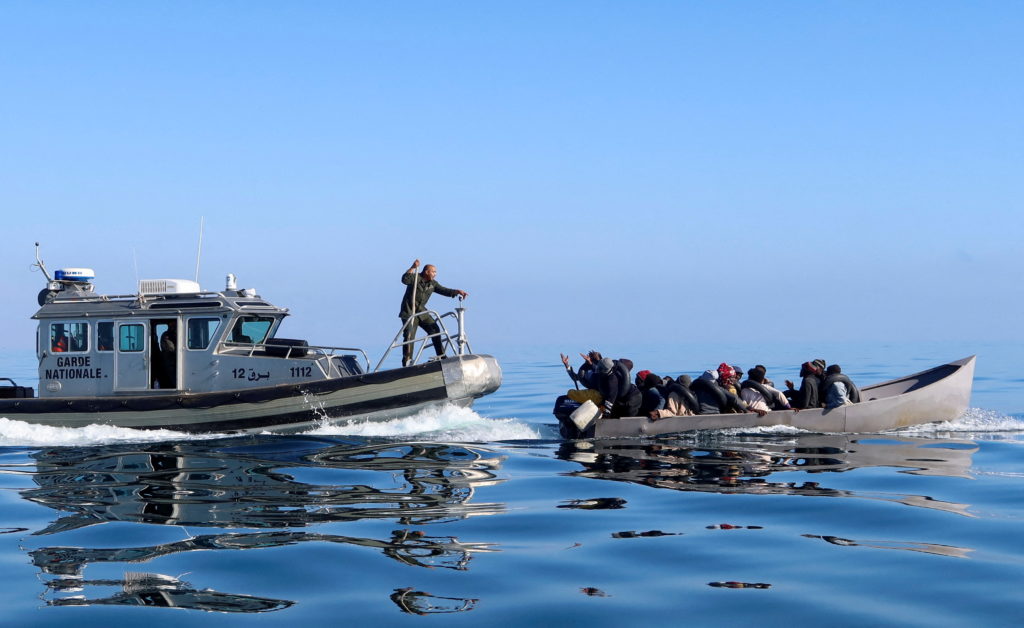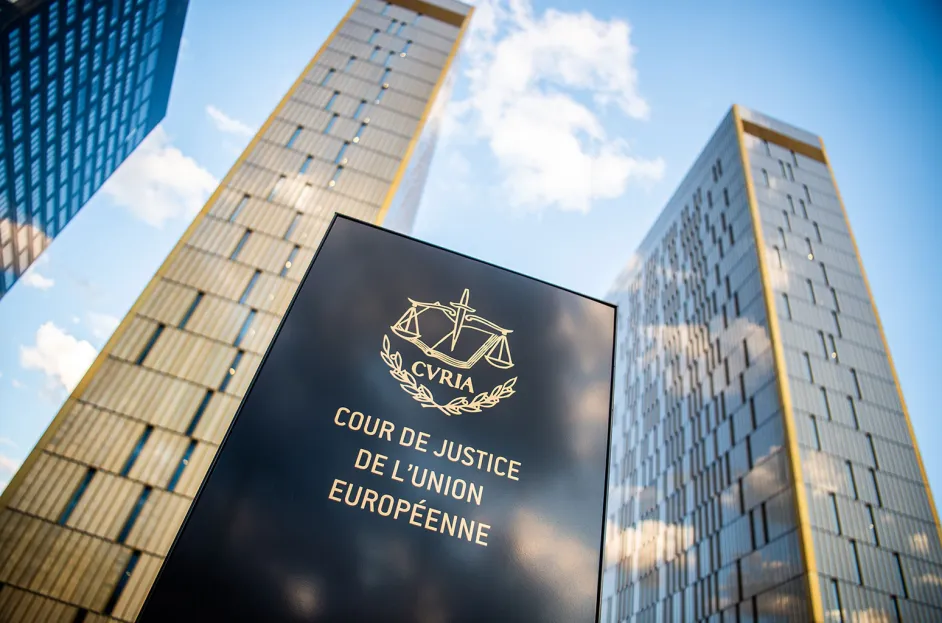Column | Absent Accountability: The EU’s Failures to Check the Power of Frontex
Assaults on refugees within the European Union are increasing. Frontex – the European Border and Coast Guard Agency meant to watch over such instances would benefit from a check on its own procedures. In order to initiate reforms, though, it is important first to ask: while Frontex watches EU borders, who is watching Frontex?

The European flag and the Frontex flag and the Frontex logo pictured during a visit to Frontex operations, during a field visit to Poland, regarding the humanitarian emergency with Ukrainian refugees rising since the invasion of Ukraine by Russia, Tuesday 08 March 2022. BELGA PHOTO NICOLAS MAETERLINCK (Photo by NICOLAS MAETERLINCK/BELGA MAG/AFP via Getty Images)
The dream of every asylum seeker praying that their boat stays afloat in the Mediterranean is to step foot on European soil. This is a dream that is crushed as refugees find just as much pain once inside European borders as they do when fleeing their homelands. Ngono, a refugee from Cameroon, was hopeful when she made the 12-mile journey across the Mediterranean from Turkey to the Greek island of Samos. But she was not safe once she arrived at the border. In September of 2021, European border agents took Ngono along with the group she had traveled with and subjected them to invasive full-body searches. Forcing them to strip off their clothes, and once they were naked, “the masked [border agents]started to assault their bodies, touching their breasts and genitals.” This violent assault of refugees by EU border officials does not exist as an isolated event. In an interview with Al Jazeera, Frontex officials conceded they are aware of continuous cases of physical assault of refugees by border agents across the EU’s Mediterranean border. This cycle of abuse is known and documented, but there has been insignificant action taken to stop it. The physical assault at EU borders has become a strategy of border management, a practice used to stoke fear amongst refugee communities in an effort to ultimately deter them from making the journey to an EU border. Who is to be held accountable for these horrific acts? The EU’s migration agency, Frontex, is tasked with “help[ing]member states to protect the common EU external border,” but the agency’s willful ignorance of these abuses makes it clear that they will not hold national governments accountable. What matters most is who can hold Frontex accountable, and if it is possible to regulate this seemingly rogue EU agency.

Existing Oversight of Frontex
Founded in 2004 with the mandate to work in conjunction with domestic immigration agencies of EU member states with the goal of standardizing border management across the bloc, Frontex has seen its power grow exponentially in recent years. Frontex is currently accountable to key oversight systems: external EU bodies such as the EU Parliament, which controls its funding and internal mechanisms. The latter consists of seven separate internal oversight mechanisms, but the respect paid to them is virtually nonexistent. One such mechanism, the Consultative Forum on Fundamental Rights (CFFR) , is meant to unite the voices of EU institutions and NGOs to guide Frontex policy. However, this mechanism has been abandoned: In 2019, members of the CFFR revealed they were no longer consulted on the development of border management processes deployed by Frontex. Frontex is making decisions without the input of outside advisors. Its Integrated Border Management Strategy (IBM) has resulted in massive human rights violations as it favors an approach of “sea border interceptions” which leads refugees to “take increasingly more desperate measures to avoid detection,” putting their lives at a greater risk. Other accountability tools, such as the Serious Incident Reporting mechanism or the Forced Return Monitoring system, exist purely symbolically. A Human Rights Watch report from 2021 revealed that systems such as the Serious Incident Reporting mechanism fail to report on the full range of abuses that take place and rarely ever change course in response to continuous abuses.
Furthermore, continued evidence of abuses is even leading to internal agency strife as “Frontex’s Management Board has expressed concern about the effectiveness of its reporting and monitoring mechanisms.” Evidence of oversight failures is vast. 11.11.11, a Belgian NGO focused on building international solidarity, published a report in March of 2023 that quantified pushbacks, a tactic that pushes migrants back over borders, committed by Frontex-backed operations, to over 225,533 people in 2022, amounting to “617 per day.” Abuses, such as those committed against Ngono or pushbacks of migrants, are violations of international law. Specifically, the 1951 Refugees Convention and the European Convention on Human Rights (ECHR). The ECHR only allows for the use of force against migrants “as a last resort, if it is necessary, proportionate and justified to achieve a legitimate aim.” Frontex is operating with this last-resort tactic as its first choice for controlling migration, prioritizing the use of force. Internal Frontex reports revealed it provided border patrol agents with pepper spray and batons, which resulted in “excessive use of force” against refugees arriving in the EU. There is vast evidence of legal violations committed by Frontex and its operations within member states—but member states are not motivated to take action to address this. This lack of action is mainly due to fear of legal repercussions for their own border patrol agencies, especially concerning Greece, Bulgaria, and Italy. But it is also tied to public opinion across the EU that is overwhelmingly anti-migration and has motivated the EU’s push to empower Frontex despite the consequences for human rights.
Frontex’s State of Exception
The inefficacy of oversight mechanisms, as well as the unwillingness on the part of member states to respond to abuses, reveals Frontex exists in a state of exception. A concept Italian philosopher Giorgio Agamben describes as the place “where the dam of individual liberties breaks, and a society is flooded with the sovereign power of the state.” In Europe, this is happening at borders and is spearheaded by Frontex. Frontex leads operations at EU borders that technically lie within the purview of EU law and human rights standards. However, most interceptions occur in areas far removed from the public’s view, therefore allowing it to circumvent EU law easily while no one is watching. Furthermore, Frontex also mounts border management operations within the Mediterranean Sea, where the lines of sovereignty are more blurred and international waters are treated as a lawless arena for migration control.
Outside of Frontex’s internal rules, the European Parliament also holds the agency accountable. In her book The Responsive Union, Christina J. Schneider notes that “the Parliament is directly accountable to European citizens via European elections,” indicating its 705 members are motivated by the domestic policy conditions within their own country when making EU-wide decisions. The problem for the European Parliament is that holding Frontex accountable could cost members of parliament their jobs, as it goes against the voter’s wishes. Germany is the country with the most seats, as they are proportional to population, and recent polling shows that “86% of Germans are worried about migration, up from 67%” in 2022. Germany’s representatives in the European Parliament are worried about placating those concerns, which means leaving Frontex alone as long as it keeps migrants out of the country.
Insufficient Attempts to Check Frontex
This being said, there have been attempts in the past by the EU Parliament to punish Frontex. Most of which have come in the past four years after a series of EU NGO investigations revealed the agency was responsible for “illegally forc[ing]back nearly 1,000 asylum seekers in the Aegean Sea.” There were two key developments as a result of this inquiry: the resignation of Frontex’s director, Fabrice Leggeri, and the EU Parliament’s temporary pause on the release of funding to the group. Unfortunately, actions such as funding cut-offs are often short-lived and exist purely as attempts to save face in light of human rights concerns. In 2023, Frontex still received more EU funding than any other agency in the bloc, even as it failed to implement all recommended changes to improve human rights conditions at EU borders.
The ability to punish Frontex is a unique power held by few EU institutions, and the feeble attempts by the Parliament to do so in the past have brought no change to how the agency operates.
European High Courts: The Final Frontier
Punishment for Frontex seems to only happen on a one-off basis. This was the case in the resignation of Fabrice Leggeri or the brief suspension of EU funds. The same goes for decisions from the European Court of Justice (ECJ), the highest court in the EU, which“oversees the correct application and implementation of EU law.” Frontex is no stranger to the court, as countless NGOs and refugees have filed claims accusing Frontex of illegal activity. In 2021, there was reason to be hopeful as an ECJ decision ruled that Hungary “had broken the law by preventing some migrants from seeking asylum,” pushing Frontex to halt its operations in the country. However, his win was short-lived as since 2022, Frontex has resumed operations in Hungary and is now under fire as it continues to ignore calls for transparency on its role in deporting people from the country.

Recent rulings from a European court in Luxembourg regarding the liability of Frontex give more reason to be discouraged about the prospect of accountability. The case involved a Syrian family of six who were deported from Greece on a Frontex operated flight to Turkey in 2016 without their asylum applications receiving due consideration. This case showcases how Frontex carries out migration operations on behalf of member states and does so with little to no oversight from national governments. However, the court ruled that Frontex could not be held liable for the deportations because they were simply carrying out orders from the Greek government. The court added that “only EU member states ‘are competent to assess the merits of return decisions and to examine applications for international protection.’” This statement seemingly indicates that Frontex plays zero role in decision-making processes at EU borders.
The European Court of Human Rights has also weighed in on Frontex violations in the past. A 2012 case regarding migrant pushbacks in Italy marked Frontex as partially accountable and found Italy had “violated the rights of asylum seekers by pushing them back to Libya.” But in response, “Italy and the EU developed a new approach of collaborating with the Libyan Coast Guard to curb migration without incurring legal responsibility.” This serves as an example of the EU sidestepping its human rights commitments by funding violations to take place in North Africa rather than Italian islands in the Mediterranean.
No EU court has been able to halt the illegal activities of Frontex fully, despite the glaring evidence of human rights violations—even personal testimony from a Syrian refugee family brought no change. With no significant consequences after multiple cases, a dangerous precedent has been set within the EU, and Frontex is consistently reaffirmed as an agency that is above bloc rules.
Conclusion
Frontex’s state of exception is not going anywhere anytime soon, as the possibility of accountability has morphed into a Sisyphean undertaking for NGOs across Europe. While it is easy to give up hope, it is also essential to understand that the EU’s current approach to migration is not bringing the results they want. Increasing Frontex’s power or funding will not make broken policies more effective, as illustrated by the story of Ngono. The consequences of Frontex’s unchecked actions leave a lasting mark on the lives of people fleeing away from danger and supposed safety. Breaking this trend of insanity on migration may well be in the future for the European Union, a turning point for thousands of refugees like Ngono whose dreams of finding safety in Europe were crushed-a future that makes the hopeful dreams of refugees achievable realities.
Cameron Roberts (she/her) is a Managing Editor and Columnist for the JPI online magazine. She is an undergraduate junior at NYU in the Global Liberal Studies program, concentrating on Politics, Rights, and Development. Her academic and research interests lie in issues related to migration policy in the Mediterranean region and conflict within the Middle East and North Africa. Outside of JPI, she volunteers with Commonpoint Queens and Serve the City. In her free time, Cameron enjoys spin classes and spending time with friends.




